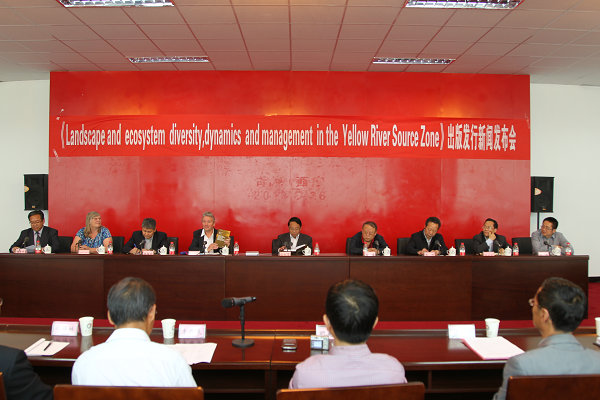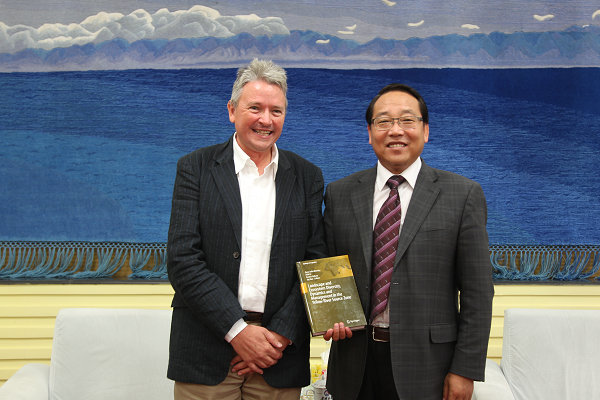On the afternoon of June 23, the press conference on the publication of the book Landscape and Ecosystem Diversity, Dynamics and Management in the Yellow River Source Zone jointly co-written by professors and experts from Tsinghua University, University of Auckland and Qinghai University was held in Qinghai University. Professor Gary Brierley and Dr. Carola Cullum from the University of Auckland, New Zealand, Fu Weidong, Representative of the University of Auckland in China, Professor Yu Hongxian, Secretary of the Party Committee of Qinghai University, Professor Chen Gang, Executive Vice President of Qinghai University, Yang Lei, Director of the Provincial Administration of Foreign Experts Affairs, authors of the book and some postgraduate students attended the conference. The press conference was hosted by Qiao Youming, Director of the Foreign Affairs Office.

On the morning of the same day, Professor Yu Hongxian met with the visitors. On behalf of Qinghai University, Secretary Yu Hongxian extended warm welcome to scholars for their visit and congratulated on the publication of book in English. He briefly reviewed the cooperation that has been carried out since the signing of the first cooperation agreement among the three universities, acknowledged the achievements in personnel training, scientific research, and joint publication of papers and treatises, and expressed gratitude to Professor Brierley for his unremitting efforts to promote the trilateral cooperation. Secretary Yu hoped that they will deepen existing cooperation, expand new areas of cooperation, and plan for the next five years based on the construction of the Three-River Source National Park, so as to produce more achievements. He proposed to make a summary of the ten years of work in 2017 since the signing of the cooperation agreement between the three universities. Professor Brierley agreed with him and expressed his willingness to keep strengthening the trilateral cooperation. After the conference, Secretary Yu Hongxian and Professor Gary exchanged souvenirs.

At the press conference, Professor Gary Brierley, one of the editors-in-chief, first illustrated the main content and innovation of the new book. It was published by the world-renowned German publisher, Springer, and co-written by researchers from three countries in different fields. Li Xilai, one of the editors-in-chief and Deputy Dean of the College of Agriculture and Animal Husbandry of Qinghai University, detailed the achievements in international cooperation projects, publication of monographs and papers, and awards won since the implementation of the cooperation agreement between the three universities.
Executive Vice President Chen Gang reviewed the background and initial vision when the agreement was signed in April 2007, and spoke highly of the prominent research results achieved through under this framework in recent years. Yang Lei, Director of the Provincial Administration of Foreign Experts Affairs, fully affirmed the achievements of Qinghai University under the framework, congratulated all the authors, and expressed his resolution to provide continuous support for Qinghai University in international cooperation and research.
It is reported that the event for the publication of the book in New Zealand will be held in late August 2016. More than 80 related people will be invited, including the Consul General of China in Auckland, President of the University of Auckland, and those from Qinghai University.
Introduction to background:
1. Introduction to content of Landscape and Ecosystem Diversity, Dynamics and Management in the Yellow River Source Zone
The Yellow River source zone, fascinating and attractive, draws few overseas tourists though, it will arrest more attention in the next years with the rapid development of infrastructure. So far, a large portion of environmental research in the zone is based on remote sensing and simulation technology. The book is a summary of results from field investigations and studies over the years. The authors hope that the book will show its charm to more people and encourage them to visit the zone in person. Also, we hope that the special value of the zone will be properly protected. Part of the cooperation project between the three universities established in 2007, the book was drafted by researchers from Qinghai University, supplemented by researchers in different fields from the University of Auckland in New Zealand, and finalized jointly with Tsinghua University and the Chinese Academy of Sciences in Beijing. The book has 15 chapters in total, with 6 chapters done by Qinghai University, 2 by Tsinghua University, 1 by the Institute of Geographic Sciences and Natural Resources Research of Chinese Academy of Sciences, and 6 by University of Auckland. Chapters:
1. Diversity of landscape and ecosystem in the Yellow River source zone
2. Climate diversity and changes in the Three-River source zone
3. Landform diversity in the Three-River source basin
4. Hydrological conditions in the Yellow River source zone
5. Slope stability in the Yellow River source zone
6. Alpine meadow ecosystem
7. Grassland ecosystem in the Yellow River source zone: degradation and restoration
8. Mugetan desert vegetation in the Yellow River source zone - erosion dynamic model
9. Wetland ecosystem in the Yellow River source zone
10. Wetland degradation in the Yellow River source zone
Research on fish in the Yellow River source zone
12. Interplay of vegetation and human land use in the Qinghai-Tibet Plateau since the Holocene
13. Ecological evolution history of the Yellow River source zone
14. Socio-economic development and its impact on the ecological environment in the Yellow River source zone
15. Future of the environment in the Yellow River source basin
II. Background and achievements of cooperation between the three universities
Cooperation background: in June 2006, President of Tsinghua University Gu Binglin, with the first high-level delegation, visited New Zealand and proposed to help Qinghai University with the joint efforts of the University of Auckland and Tsinghua University, which was supported by the Prime Minister of New Zealand; in July 2006, the Minister of Education of China Zhou Ji invited McCutcheon, President of the University of Auckland in New Zealand, to the 3rd Sino-foreign University Presidents Forum in Shanghai for a keynote speech.Both parties recognized the potential importance of the cooperation between the three universities, and then arranged a meeting with Chen Qiang, President of Qinghai University; in September 2006, the presidents of the University of Auckland in New Zealand, Tsinghua University, and Qinghai University met with Minister Zhou Ji. Mr. Zhou supported the inter-university partnership and named it the "Three-Brother Project"; in October 2006, Vice President of the University of Auckland Christopher Tremewan, Vice President of Tsinghua University Cen Zhangzhi, and the representative of the University of Auckland in China Fu Weidong visited Qinghai University and reached an initial consensus with the responsibilities of the three parties to the project specified; in December 2006, the University of Auckland made internal budgeting for the five years and four phases of the project (including scope, construction, enhancement, and evaluation of the project); in May 2007, presidents of the University of Auckland, Tsinghua University, and Qinghai University signed the Memorandum of Understanding ("Three-Brother" Cooperation Agreement) at the China-New Zealand Education Forum; in August 2012, the three parties signed the second-round five-year cooperation plan at the University of Auckland.
Important achievements: Relying on the "Three-Brother" cooperation plan, 2 special projects for international scientific and technological cooperation, 5 projects under the America and Oceania Office of the Department of International Cooperation and Exchange of the Ministry of Education, 10 projects under the Administration of Foreign Experts Affairs, and 8 international cooperation projects under the Qinghai Provincial Department of Science and Technology were completed.In 2015, Qinghai University and Lincoln University in New Zealand jointly applied for the international cooperation project under the Ministry of Science and Technology "Research on Nutrient Flux and Sustainable Production on Plateau Grassland by China and New Zealand," which was approved and is now under implementation. Up to now, a total of 6 books have been published, with two of papers for international academic conferences in English, two of academic monographs in Chinese, and two of academic monographs in English (published by world-renowned publishing houses). Based on the project research, a total of 55 papers have been published, including 23 in SCI, 12 in CSCD, 4 in EI and 16 in key journals in China. Qinghai University sent 8 teachers to the University of Auckland, New Zealand, among whom there are two PhD candidates and one obtaining the PhD degree. Since 2008, Qinghai University has sent 1-2 young and middle-aged teachers on average per year to the University of Auckland in New Zealand for further study so as to improve its teaching qualification. Nearly 20 postgraduate and undergraduate students in Qinghai University have been involved in the international scientific and technological cooperation projects, for the purpose of enhancing students' technological innovation capabilities. From 2010 to 2014, 4 PhD candidates from the University of Auckland in New Zealand participated in China’s research projects. China and New Zealand launched joint cultivation of students, so as to enhance the school-running standard of Qinghai University. Seven international exchange oriented academic conferences on the “Three-River Source” and six related training courses were held. Professor Gary Brierley from the University of Auckland in New Zealand won the 2013 Qinghai International Cooperation Award for Science and Technology, and was approved by the State Administration of Foreign Experts Affairs as a 2014-2016 high-end foreign expert. Professor Li Xilai, a key academic figure in China, won the 2014 Overseas Chinese Contribution Award (Innovative Talent). Yan Lin, Hu Xiasong and Sun Haiqun won the third prize of 2014-2015 Qinghai Provincial Science and Technology Progress Award.
Foreign Affairs Office of Qinghai University: Li Qiong Party Committee Publicity Department: Guo Yongfa
